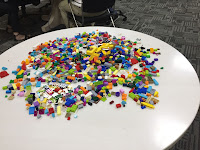Most of my friends don't work in IT. Therefor it is some time difficult explain what I do as a Scrum Master. And when tell about my daily work some of them say "so you are kind of a project manager". What can you say?
Usually we don't talk so much work when I am with friends. We all have so different jobs and free time is not for talking about job.
But some time ago I met a new person and we started discuss what it is we do beside having dogs of same breed. And when I told that I am a Scrum Master she suddenly said "so am I". For a short moment I was happy: finally someone who knows what I do. But then she continued "What else do you do?"
"What do you mean? I am full time Scrum Master." She looked, honestly, surprised and told that she has double role and in her company there is no full time Scrum Masters.
Of course, I reflected after that discussion what it is that makes it possible for me work full time Scrum Master. What are my days like? How do I fulfill my days? What is my daily agenda?
First of all, I am perhaps little bit over-organized. I like to-do lists, I keep notes, I write down things. I feel more confident when having my notes with me. I always have my note book and pen with me. I feel naked without them. I am almost like addicted.
 |
When I start planning next PI (Program Increment), first thing I do is write down Iterations time line. That helps me in planning coming 12-14 weeks.
|
Before each meeting I check what we have in agenda, is there anything I need prepare or any other action I should take. All my meetings have clear agenda and goal. I ask people to read my invitations. I want them to be ready as well. Efficient meetings in planned timebox are another addiction of mine.
I follow our team progress in JIRA by using different
dashboards. At the same time I love and hate metrics. I am always careful what do I show to the teams. Not all metrics are our friends and almost everything can be misused or misread. So I don't spend so much time daily basis with metrics but I am on the top of them. From time to time I evaluate whether I should change something and try out different ways to show data. Data is our friend when used correctly.
I follow what is going on and if needed, I intervene. I participate meetings team members have and try to get on the top of the discussions and issues we face. I want people outside the team get to know me so that they more willingly contact me.
I talk and chat with team members. I am currently in team where all team members are distributed in five different countries. Even without Covid-19 I wouldn't see them during work days. I try to be available for their questions. I have bi-weekly 15 minute one-on-one discussions with all team members. I build trust, I share, I care.
I discuss or char with my Scrum Master colleagues. I currently have three Scrum Master colleagues and even I do not daily basis discuss with all of them I am in contact at least with one of them daily. That is even more important in this set-up when it is not possible to meet face-to-face. I am always available if they have anything to ask or discuss. I always reach them if I have something. I believe sharing is caring and this way we can support each other and learn while doing that.
I have daily focus topics in my calendar. If there is any free time - like there is slot or two in normal days - I focus on one specific topic. There are different topics. For example days when we have Backlog Refinement meetings I focus on refinement. I might look for ideas how to split stories. There is always something to learn and things to try out with team. Extremely important for me as Scrum Master put focus both on my own development and team's improvement.
I want team to have fun. People do matter and I want them to enjoy their work days. I spend some time to figure out something fun to do with them. Not daily, but quite often. It is not a big job to find out some funny pictures, funny stories to share or similar. Using music in meetings and showing videos. Little bit more challenging in remote context but achievable. I just need to be more creative than when team is colocated.
For me being Scrum Master means that I do not do anything team members themselves can do. My job is mostly invisible for them and also for others around the team. And I honestly believe that is how it should be. I am suppose to be the non-visible person behind the team.






